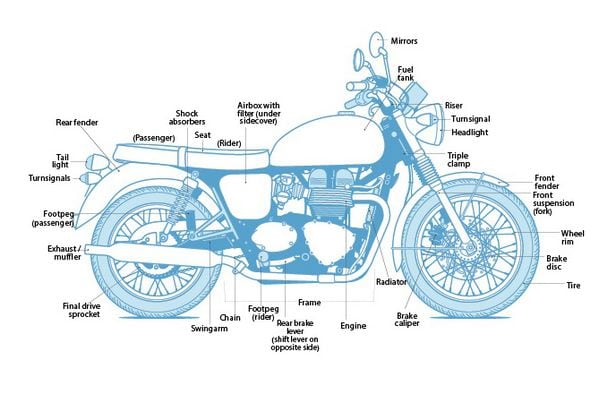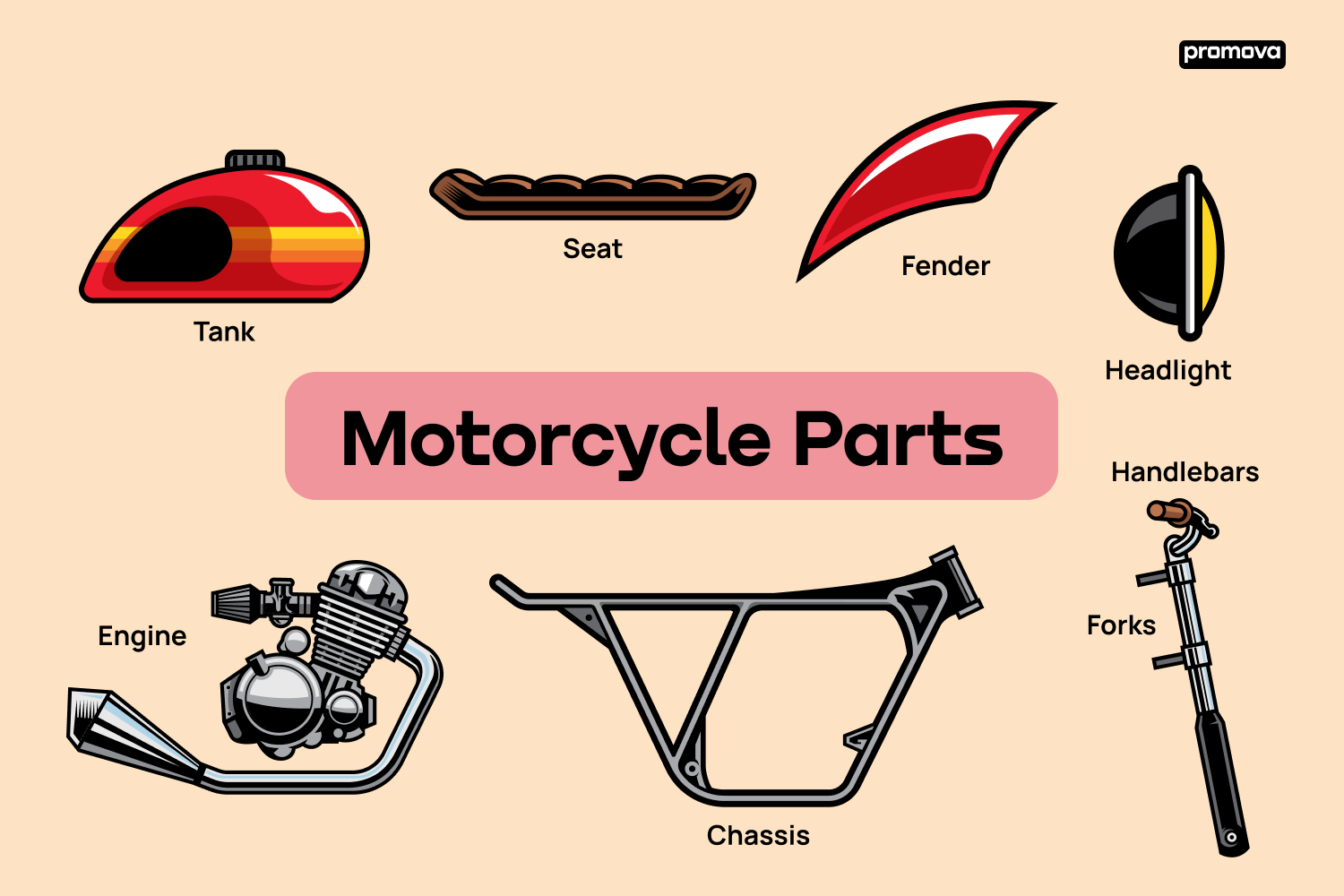The Top Maintenance Habits to Extend the Life of Your Motorcycle Spares Christchurch
The Top Maintenance Habits to Extend the Life of Your Motorcycle Spares Christchurch
Blog Article
Discover the Necessary Motorcycle Parts You Need for Optimal Efficiency
Comprehending the vital parts of a motorcycle is basic for attaining peak performance. Each element, from the engine to the stopping system, plays a critical role in overall performance and safety. Regular upkeep can avoid unforeseen failures and enhance the riding experience. Lots of motorcyclists neglect the ins and outs of these systems. Uncovering how they interact can result in a much more effective ride. What critical components should every cyclist prioritize?
The Engine: The Heart of Your Bike
The engine functions as the core element of a bike, driving its performance and defining its capabilities. It is in charge of converting gas into power, which powers the bike forward. Different kinds of engines are utilized, including single-cylinder, V-twin, and inline configurations, each offering unique features suited for various riding designs and objectives. The engine size, commonly gauged in cubic centimeters (cc), significantly affects performance, with bigger engines usually providing more power and torque.Furthermore, the engine's design and modern technology, such as fuel shot systems or air-cooling versus liquid-cooling, affect efficiency and integrity. Maintenance is essential for peak procedure; aspects like regular oil modifications and checking spark connects warranty longevity. Motorcyclists usually consider an engine's responsiveness and level of smoothness, as these characteristics boost the overall riding experience. Inevitably, the engine stays an important component that defines not just the motorcycle's performance but additionally the biker's link to the equipment.
The Transmission: Shifting Gears Efficiently
The transmission plays a vital function in a motorcycle's performance, specifically in the auto mechanics of equipment changing. Recognizing how to shift equipments smoothly can improve the overall riding experience, while routine upkeep warranties peak capability. Correct attention to these facets can substantially affect the longevity and performance of the motorcycle.

Gear Shifting Mechanics
Smooth gear changing is vital for suitable motorcycle performance, considerably impacting both acceleration and control. The mechanics of equipment changing include the communication in between the clutch, equipment lever, and transmission system. When a biker engages the clutch, it disengages the engine from the transmission, enabling for an equipment change without harming the components. A well-timed release of the clutch, incorporated with specific motion of the equipment lever, facilitates a smooth change in between equipments. This process ensures that the engine operates within its best power band, improving performance. Bike Parts Wellington. In addition, recognizing the gear ratios and their effect on rate and torque can assist motorcyclists make informed options during shifts, ultimately adding to a much more receptive and enjoyable riding experience
Upkeep Tips Value
Regular upkeep plays an essential role in ensuring that the transmission system operates successfully, enabling smooth equipment shifts. Consistently altering the transmission and examining fluid is vital, as old liquid can result in increased friction and wear. Additionally, inspecting the clutch for wear assurances peak interaction and disengagement, preventing slippage during equipment adjustments. Lubrication of moving parts is just as vital to reduce friction and boost efficiency. Bike proprietors need to likewise monitor for leakages and uncommon noises, as these can suggest underlying problems. By sticking to these maintenance ideas, bikers can prolong the life expectancy of their transmission system, ensuring that equipment changes remain smooth and adding to the overall performance of their motorbike.
The Braking System: Ensuring Safety And Security on Every Ride
Braking systems are basic components that straight affect a motorcycle's safety and security and performance. They contain different components, consisting of brake pads, blades, calipers, and hydraulic lines, all interacting to ensure effective deceleration. The sort of stopping system-- generally either disc or drum-- influences responsiveness and quiting power.Regular upkeep is necessary to copyright peak performance; worn brake pads can lead to reduced efficiency and enhanced stopping ranges. In addition, the quality of brake fluid must be kept an eye on, as it can absorb wetness over time, compromising stopping efficiency.Riders need to additionally take into consideration the value of anti-lock stopping systems (ABDOMINAL MUSCLE), which avoid wheel lockup during sudden stops, improving general security. Correctly functioning brakes are not nearly quiting; they impart confidence in the rider, permitting for safer navigating through different surfaces. Eventually, a reputable braking system is critical for taking pleasure in every experience with tranquility of mind.
The Suspension: Enhancing Convenience and Control
A well-functioning suspension system substantially adds to a motorcycle's total performance, matching the performance of the stopping system. The suspension plays a considerable duty in taking in shocks from irregular surfaces, guaranteeing a smoother experience while keeping tire call with the road. This contact is necessary for both security and control, allowing cyclists to browse edges with self-confidence and precision.Different kinds of suspension systems, such as telescopic forks or mono-shocks, offer differing degrees of convenience and handling. Appropriately tuned suspension enhances responsiveness, providing the biker with a more connected feel to the motorbike. Routine maintenance checks are reference necessary to determine the suspension components, consisting of dampers and springs, are operating at their ideal. An efficient suspension system not only elevates the riding experience but additionally adds to the durability of other motorcycle components by minimizing wear and tear. Consequently, purchasing high quality suspension is crucial for any type of major motorbike fanatic.
The Tires: Attaching You to the Roadway
Tires play a vital function in a motorcycle's performance, functioning as the key web link in between the biker and the roadway. Understanding the various sorts of tires offered can greatly influence handling and security. Furthermore, regular maintenance is essential to assure peak tire efficiency and durability.
Tire Keys In Explained
Exactly how do various tire types influence a motorbike's performance? Tire types play an essential duty in establishing a motorbike's stability, hold, and handling. Sporting activity tires, created for high performance, offer boosted traction and responsiveness on paved roads, making them suitable for competing and hostile riding. Conversely, exploring tires prioritize sturdiness and convenience, providing a smoother ride for long-distance traveling. Off-road tires, characterized by their sturdy step patterns, excel in traction on unpaved surface areas, suitable for adventure fanatics. Additionally, dual-sport tires mix attributes from both on-road and off-road categories, satisfying flexible riding requirements. Inevitably, selecting the best tire kind is essential for optimizing efficiency, ensuring safety and security, and enhancing the overall riding experience.
Upkeep Tips Offered
While riding when driving, maintaining suitable tire condition is vital for safety and security and performance. Consistently checking tire pressure is necessary, as under-inflated tires can bring about bad handling and increased wear. It is advisable to inspect step depth often; used tires concession hold and security. In addition, bikers need to search for indications of damages, such as bulges or fractures, which can suggest the demand for substitute. Turning tires occasionally ensures even use, enhancing longevity. Furthermore, maintaining tires tidy from debris and avoiding excessive curbs can lengthen their life expectancy. Keeping proper positioning and balance adds to peak performance, reducing anxiety on various other bike parts. Following these upkeep pointers will significantly improve the general riding experience.
The Gas System: Fueling Efficiency and Effectiveness
The gas system plays a crucial role in taking full advantage of a motorbike's efficiency and effectiveness, as it ensures the ideal delivery of fuel to the engine. It makes up a number of crucial parts, including the fuel container, gas pump, fuel filter, and fuel injectors or carburetor. Each component has to function properly to assure a smooth and effective ride.The fuel container shops fuel and provides it to the engine by means of the fuel pump, which generates the essential stress. A fuel filter protects against pollutants from getting in the engine, while the injectors or carburetor mix gas with air for combustion.Proper upkeep of the gas system is essential; a stopped up filter or malfunctioning injector can result in reduced efficiency and boosted fuel intake. By validating that the gas system runs efficiently, bikers can enjoy improved throttle reaction, much better fuel economy, and in general enhanced riding experience.
The Electrical System: Powering Your Adventure
A reliable electrical system is important for the total functionality and safety and security of a motorbike, as it powers essential elements such as the ignition, illumination, and different digital systems. This system includes the battery, which stores power, and the alternator, in charge of creating power while the engine runs. The wiring harness connects these parts, making certain reliable power distribution.Additionally, integrates secure the system from overloads, while relays assist control high-current gadgets with low-power signals. A well-kept electric system enhances performance by making certain smooth starts and constant operation of signals and lights, crucial for rider presence and safety.Regular checks of the battery's charge and links are essential for avoiding electric failings. Cyclists ought to likewise check electrical wiring for deterioration, making sure all components function preferably. Ultimately, a robust electrical system contributes substantially to the overall efficiency and integrity of the motorbike.
Often Asked Inquiries
Just how Commonly Should I Replace My Bike's Battery?
The regularity of motorcycle battery substitute depends on use and maintenance (Motorcycle Spares Christchurch). Normally, batteries should be replaced every three to 5 years. Regular checks can assist recognize when a replacement is required for peak performance
What Tools Do I Required for Basic Bike Upkeep?
For basic bike maintenance, one requires vital tools such as an outlet set, wrenches, screwdrivers, pliers, tire stress scale, and a torque wrench. These tools help with effective maintenance and assure the motorbike runs effectively and safely.
Exactly How Can I Improve My Motorcycle's Aerodynamics?
To improve bike aerodynamics, one must think about you could look here adjusting fairings, using windshield extensions, optimizing body position, and decreasing overall weight. These adjustments help reduce drag, enhancing stability and gas performance throughout adventures.
What Are the Indications of a Failing Electric System?
Signs of a stopping working electrical system include lowering lights, difficulty beginning, irregular tool her latest blog readings, and blown fuses. Motorcycle Spares Christchurch. Uncommon scents or corrosion around battery terminals may additionally suggest underlying problems needing prompt interest for safety and security and efficiency

Just how Do I Select the Right Oil for My Motorcycle?
When picking oil for a motorbike, one ought to consider the manufacturer's specifications, viscosity scores, and the kind of riding. Additionally, standard versus artificial oil can affect efficiency and engine defense, influencing the decision significantly. The engine size, typically gauged in cubic centimeters (cc), significantly influences performance, with larger engines typically offering even more power and torque.Furthermore, the engine's style and modern technology, such as gas injection systems or air-cooling versus liquid-cooling, impact effectiveness and integrity. A well-functioning suspension system significantly contributes to a motorbike's overall performance, enhancing the effectiveness of the braking system. The gas system plays an important duty in taking full advantage of a motorcycle's performance and efficiency, as it assures the optimal delivery of fuel to the engine. A fuel filter stops impurities from going into the engine, while the injectors or carburetor mix fuel with air for combustion.Proper maintenance of the gas system is crucial; a blocked filter or malfunctioning injector can lead to reduced performance and enhanced gas intake. A well-maintained electric system enhances performance by making sure smooth starts and constant operation of signals and lights, important for cyclist presence and safety.Regular checks of the battery's fee and connections are important for avoiding electrical failings.
Report this page